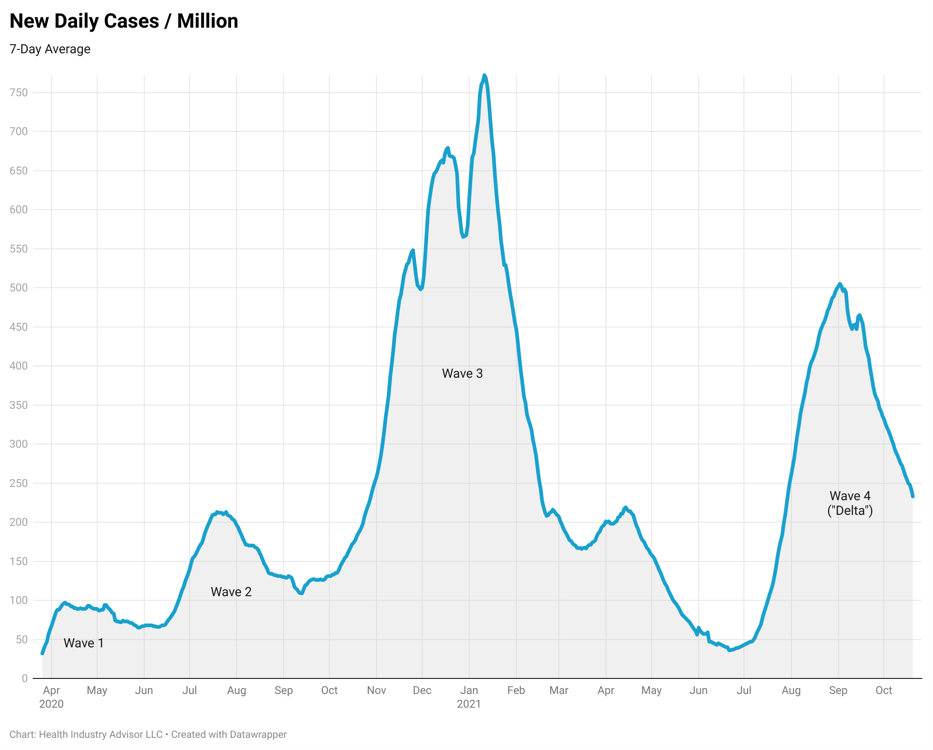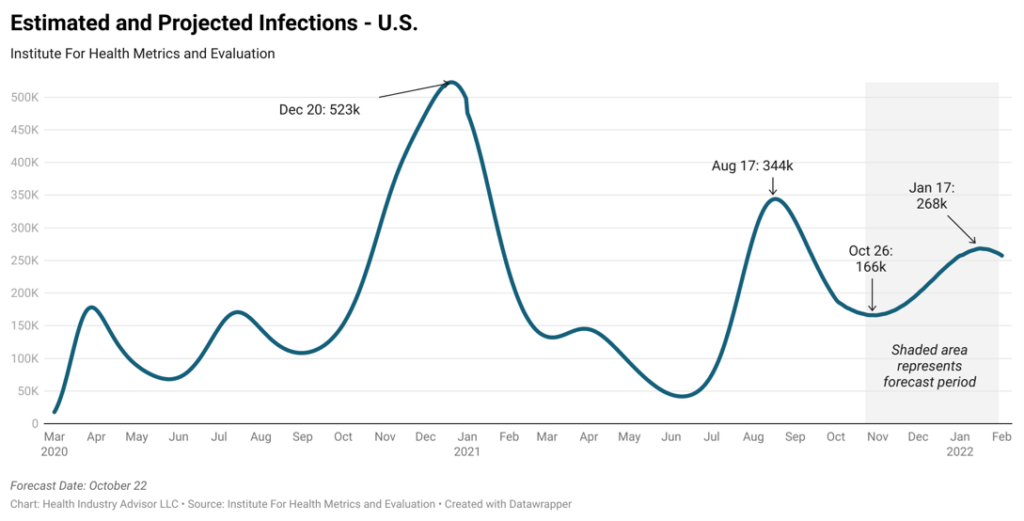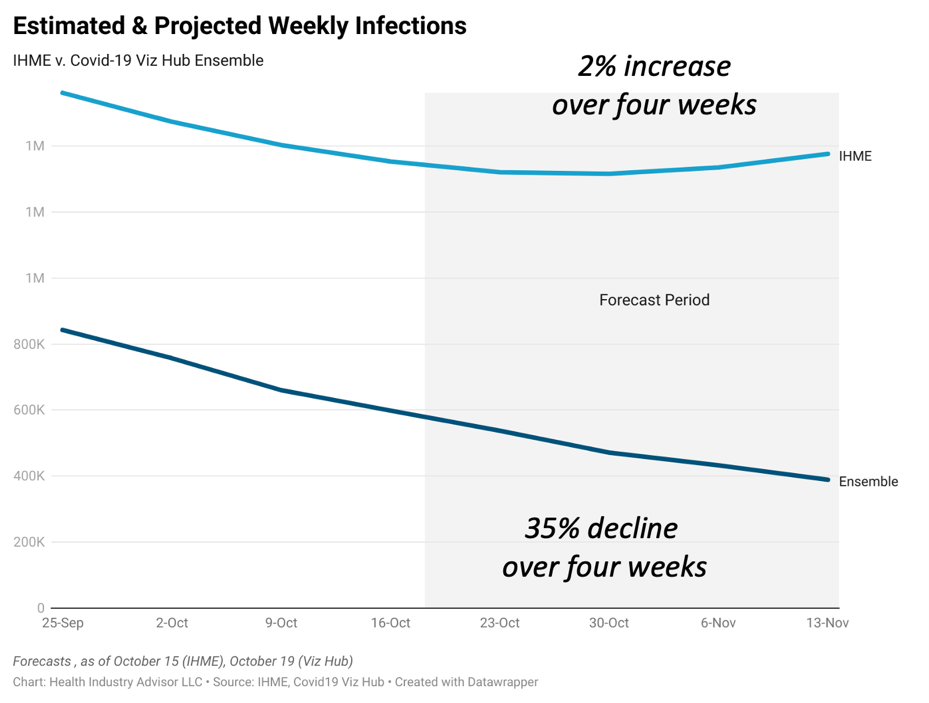October 25, 2021 – We have experienced four waves in the Covid19 pandemic in the United States, the most recent wave fueled by the Delta variant of the virus. Each wave has differed in length and magnitude. Nonetheless, these waves shared a common characteristic: the duration of each wave’s receding tide (declining infection rate) has generally matched the term of the wave’s rising tide (increasing infection rate).

The Delta wave commenced on June 22 and peaked on September 2, a duration of 72 days. Today marks the fifty-third day since this peak. Does this suggest a return to increasing cases (a fifth wave) in the next few weeks?
Experts disagree.
One View: The Fifth Wave Could Commence Soon
Some experts point to seasonal virus patterns (like the flu, another coronavirus) and the onset of colder weather across the country. Likewise, they raise the prospects of another emerging variant(s). Currently, the United Kingdom is experiencing a Covid surge, which some attribute to a Delta variant subtype, AY.4.2 or “Delta plus.” However, this variant accounts for only 6% of sequenced Covid cases in the U.K. (Scientists have documented few instances of this variant in the United States at this point.) Instead, experts cite waning protection from the AstraZeneca vaccine and low levels of teenage vaccinations as other possible explanations for the surge.
The Covid projection model from the Institute for Health Metrics and Evaluation (IHME) reflects this “glass is half empty” perspective. In its model published on October 15, IHME predicted that new cases could begin rising this week and ascend through mid-January. In IHME’s estimation, new daily cases could spike by 60% during that span.
If this projection holds, that will represent the fifth wave in the United States.

A Different View: Vaccines and Natural Immunity Send Infection Rate Lower for Another Month
The counterargument relies on built-up immunity in the population due both to prior infections and to vaccinations. More than two-thirds of eligible Americans are fully vaccinated. With last week’s approval of booster shots and anticipated approval of childhood (ages 5-to-11) vaccines within a week or two, this protection will only get stronger.
Further, the impact of natural immunity (derived from prior infection) often gets overlooked. Many experts suggest that natural immunity provides as good or better protection than inoculation from most viruses. Using estimates from a team of public health officials from Harvard, Stanford, and Yale, nearly half the U.S. population could have natural immunity from Covid. (Note: this figure is likely somewhat lower due to the number of re-infections.)
Another counterargument involves the dominance of the Delta variant. To date, Delta has muscled-out subsequent variants (e.g., “Lambda”, “Mu”). The characteristics that rendered Delta so formidable may restrict succeeding variants from gaining traction.
Further, it is instructive to compare our position today to how we entered the Delta wave. Twenty-six percent more Americans are fully vaccinated now than in June when the Delta wave commenced. Also, up to 40% more people have natural immunity now than in June (based on the Harvard/Stanford/Yale model). (Again, this number is likely lower due to the number of re-infections.)
Reflecting this “glass is half full” perspective is an ensemble forecast model, published by Covid19 Forecast Hub and reported by the CDC. This source is a repository of projections from over 50 international research groups. The ensemble produces a weekly rolling four-week forecast.
The most recent ensemble forecast, published last week, predicts that new cases will drop 35% over the next four weeks. This forecast counters the contemporaneous IHME model, which indicated an overall 2% increase in this time (declining the first week then rising the next three weeks).

Note: IHME uses a proprietary estimate of actual infections rather than detected cases. The ensemble model more closely resembles reported cases.
The next several weeks could reveal where we go from here with the Covid pandemic. Will we experience a fifth wave, whether caused by seasonality factors or an emerging variant? Large numbers of unvaccinated people worldwide provide a fertile opportunity for these new variants to emerge.
It would be naïve or shortsighted to discount the possibility of a fifth wave.
Still, will our natural and vaccine-produced immunity (and, perhaps, Delta’s continued ability to crowd out subsequent variants) mute any future waves? At a minimum, it seems reasonable to expect a fifth wave should be less severe than either of the two previous waves. Further, downward trends in infection and test-positive rates suggest that any fifth wave may not commence as soon as IHME predicts.
Contributing writer:
Mark A. Van Sumeren, strategic advisor, Medical Devices & Integrated Delivery Networks
Health Industry Advisor LLC, provides a regular report on COVID-19 numbers for the health care industry.
For more information, or to sign up for the report, contact Mark at Mark.VanSumeren@HealthIndustryAdvisor.com; or visit www.HealthIndustryAdvisor.com.
